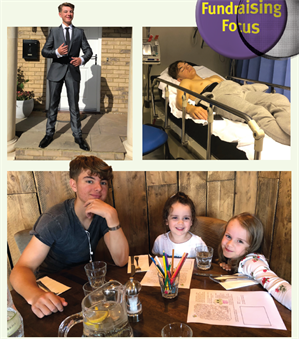
I was 19 when I gave birth to my son Isaac. Despite all seeming to be well, it soon became apparent that something was failing within his body. Persistent jaundice, teamed with low
blood sugars, low body temperature and an inability to feed, made the first month of his life a case of survival. His diagnosis of hypopituitarism at three weeks old was a double-edged sword. Finally, I had an answer to his illness. However, a diagnosis of a rare and life-long medicated journey was daunting for us both.
As the years went on, Isaac suffered multiple adrenal crisis events. I was young and this seemed to work against me, and despite being on medicine, Isaac’s body just couldn’t cope. Doctors would tell me that it would improve, that he was still growing, maybe even he wasn’t receiving his medicine? I would cry tears of frustration at not being heard and failing my son; if the doctors didn’t know, then where did that leave him? Feelings of vulnerability and anger were always present and we spent his early years living on eggshells. What had to happen to be listened to? After an awful crisis where his blood sugar dropped below reading level, I found the confidence and requested to be seen by another consultant. This consultant didn’t just hear me, he listened to me, and he understood and believed my hunch. He quickly determined that he was metabolising his steroids far too quickly and depleting with very little strain. I had been right to question the doctors and professionals, because despite their medical expertise, they didn’t know HIM. A quick tweak of his medicine and Isaac was not to experience another crisis for many years.
I was sure that this attitude was isolated, yet the familiar pattern of him falling unwell, me requesting urgent care – being ignored and subsequently later proved right, was a rollercoaster of frustration and relief. Isaac would ultimately get the care he required. Albeit delayed.
16 years on and after three years crisis free, Isaac suffered an adrenal crisis – partly due to fluctuating hormones and partly due to his admirable but slightly frightening stubbornness to be ‘normal’. I saw the crisis coming and started the familiar routine; I knew now that ambulance staff carry the hydrocortisone drug and that adrenal conditions are now taught as part of ambulance staff training (a big thank you to The Pituitary Foundation for encouraging and campaigning this). Yet, we still waited 50 minutes for an ambulance, meaning I administered the emergency injection myself, as his blood sugar dropped to 2.9. I still had to insist on re-doing his blood sugar at hospital even though the staff reassured me his base level was fine (it wasn’t). This was followed with a request to ring his consultant when they said hydrocortisone medicine could not be administered for another six hours. This was also overruled and given precisely one hour later, not six hours. As I write this, Isaac has had a drip for 24 hours and is due home tonight. This recovery, like all his others, is thanks to the NHS and all the hospital staff, however, I still believe we have a long way to go in relaying how important it is to let parents and patients relay THEIR gut instinct, THEIR
knowledge based on years of experience. That way we can help THEM to help those that require the care. It’s time to listen – not just hear.
The Pituitary Foundation have been a huge help to Isaac, myself and my family over the years, and as such, I wanted to give something back. I was part of the team that ran the London Landmarks Half Marathon in 2018, which I’d highly recommend. I raised over £1000 and I am taking part in the ArcelorMittal Orbit in September. If you are contemplating raising funds for the charity I would urge you to do so, as I know just how much it means to them and just how much they need it.







